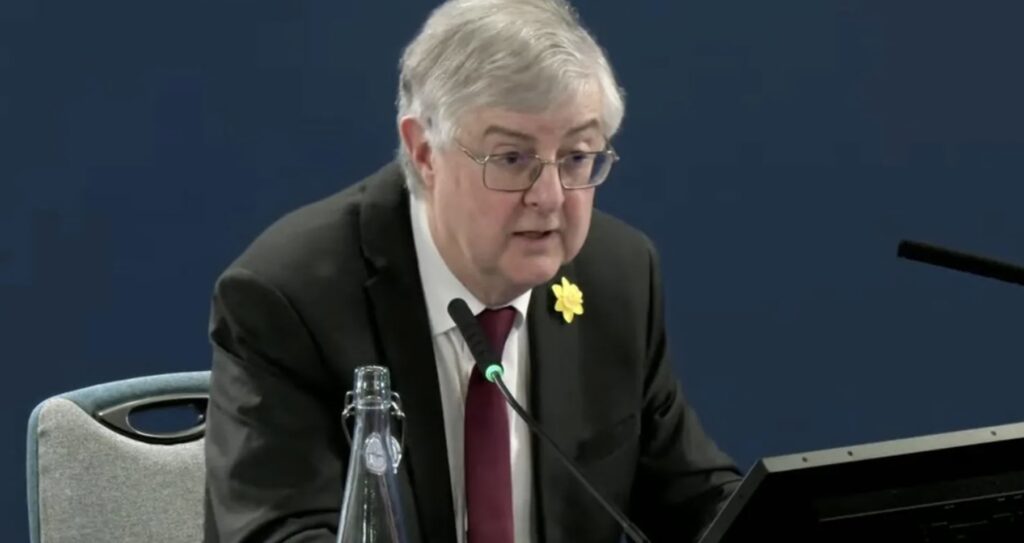Cracks emerge in the Covid inquiry consensus


Small cracks are emerging in the mainstream Covid consensus following three weeks of proceedings in Wales, which wrapped up this week. Building on 10 months of public hearings so far, testimonies in Cardiff brought to light specific revelations that, if taken seriously by the inquiry, could help reorientate the way Baroness Hallett and her team have approached what should be a core concern: did lockdowns and other mandatory social distancing rules cause more harm than good?
Mark Drakeford, Wales’s outgoing First Minister, told the inquiry that local Covid lockdowns were a “failed experiment”, while epidemiologist Dr Chris Williams, who advocated for earlier lockdowns, admitted that trying to contain a virus like Covid was “essentially impossible after a while”.
They were not the only ones. Dr Roland Salmon, ex-director of Public Health Wales’s communicable diseases unit, went further by criticising school closures, firebreak lockdowns, and social distancing policies in places such as grocery stores and pubs, which even received some surprising coverage from the BBC. Meanwhile, Education Minister Jeremy Miles told the inquiry they needed “more impact assessments” about the harms of lockdown. Available assessments made in 2020 in Wales clearly predicted dramatic harms to population health and wellbeing.
We also heard from former Welsh Secretary Simon Hart, who informed the inquiry that stricter pandemic rules in Wales were different from England “for the sake of being different”. Welsh government ministers themselves suffered from “significant confusion” about the Covid rules they were responsible for implementing. This echoes similar concerns in England. In fact, the Welsh government appears to have acted unlawfully when it shut schools in March 2020 (such power officially resides with school governing bodies). Many of the criminal charges meted out to those who breached lockdown rules were also unlawful, the inquiry heard.
So small cracks have emerged from the mainstream consensus, and to the competent investigator these new revelations should be linked to similar earlier statements made in England and Scotland. But scientists, such as Dr Salmon, who were willing to question lockdown orthodoxy rarely feature on the inquiry panel. The inquiry has only heard from a few other scientists with this dissenting opinion, including Prof. Carl Heneghan from Oxford and Prof. Mark Woolhouse from the University of Edinburgh.
Yet on Wednesday this week, Baroness Hallett appeared to take a more balanced approach to her previous confrontational line of questioning with the Great Barrington Declaration.
When questioning Drakeford, she stated that the impacts of lockdown spread “far and wide”. “By just following your expert who happens to be in the pro-lockdown camp,” said Hallett. “You’re never listening to an expert who may say ‘Well, wait a minute, lockdown is not necessary’; for example, those who signed the Great Barrington Declaration. So did you deny yourself the alternative argument?”
This comes on the heels of an open letter released this week, and signed by 55 UK academics (including me) which criticised the inquiry for bias in largely ignoring the harms of Covid policies. A recent survey conducted by the Telegraph of nearly 200 UK scientists also questioned the notion that a scientific consensus about Covid policies exists; in fact, the majority believed more consideration should have been given to lockdown harms.
It is time for the inquiry to grapple with the core issue: did lockdown and mandatory social distancing rules cause more harm than good? To do so, Baroness Hallett will need to change course. She will need to invite more experts who advocated for a risk-stratified policy response. She will need to confront the preferential treatment of bereaved family groups. And she will need to see past the political impulse to “do more” during a national crisis, a course of action that ignored key parts of the existing respiratory pandemic playbook.
Cracks are starting to open up for a more serious and critical examination of the fundamental policy decisions which were made. Let’s hope this inquiry, predicted to run until 2026, matures more with age.
Follow Kevin Bardosh on X (formerly Twitter) @KevinBardosh
